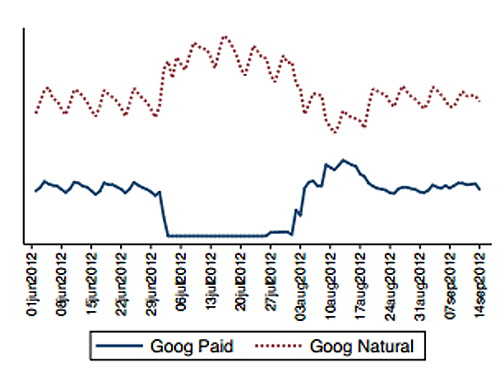Research by eBay suggests paying to advertise on Google only works in limited circumstances and even then the effect isn’t massive. It also suggests that for established brands at least, slashing the ad spend causes little damage.
The company intentionally suspended its advertising for a trial period, save for in several regions used as a control. It then asked three in-house economists to analyze the results.
They found that ditching paid ads for brand names (either simply “eBay” or combinations such as “ebay shoes”) made no significant difference whatsoever. It believes that’s because in almost every situation somebody searching for those terms simply found a link to the relevant eBay page through Google’s “natural” (non-paid) search results, as indicated in the graph above.
It also noted that numerous other brand owners were paying to be atop the sponsored search results list, even though they were also number one in the main search results, effectively wasting their case.
Turning to non-branded keywords, eBay found that although removing the advertising may have dropped the number of visitors, it had only a “statistically insignificant effect” on sales. That’s because eBay has a customer base where the most frequent buyers make up “most” of the sales. Those customers who are attracted by advertising for non-branded keywords are much more likely to buy only one or two items a year.
Overall, eBay found the only real difference paid advertising on Google makes is attracting first time visitors or persuading infrequent users to check out the site, for example when there’s a special deal on. In other words, eBay believes Google advertising only really works as an informative rather than persuasive tool.
Clearly the results won’t hold true for all companies: the limitations eBay points to are mainly relevant to those with well-established brands with an existing core customer base. Still, this is a significant group: eBay cites a report showing that the 10 highest spending companies alone pay a combined $2.36 billion.
Google responded by noting its own research shows a clear link between ads and increased visits to a website, though didn’t specifically address the issue of whether these visits boost business. It did note that results vary widely and highlighted the way its ad services make it much easier for companies to experiment with different tactics than they can with more traditional advertising media.
eBay hasn’t yet announced what, if any, changes it will make to its Google advertising in the long run as a result of the study.

